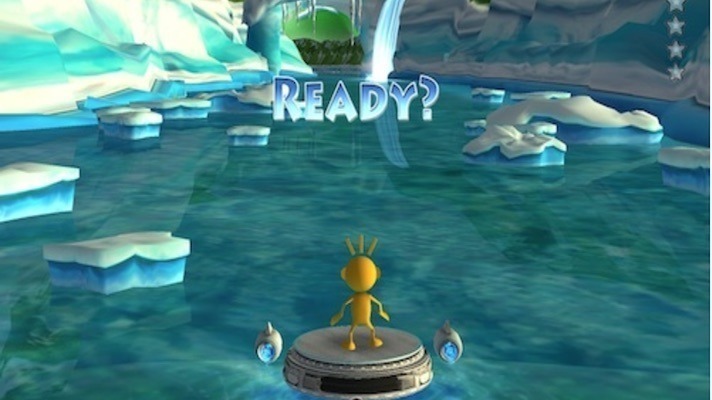Large study finds positive yet mixed results from Akili’s digital therapeutic for kids with ADHD
 __
__
Full publication of pivotal trial data outlines Akili’s case for FDA regulation (MobiHealthNews):
“A full transcript of STARS-ADHD — the pivotal trial of Akili Interactive’s video game-like pediatric attention deficit treatment — has been published in The Lancet Digital Health journal, providing onlookers a clear view of data fueling the digital therapeutic company’s pending FDA submission … Those in the intervention group (n = 180) received a tablet with AKL-T01, which requires players to focus on navigating an alien avatar through a course while responding to on-screen prompts. The control group (n = 168) received an educational word game that was also designed by the company.
The primary outcome of interest was the mean change in TOVA API — an objective, validated measure of attention and inhibitory control cleared by the FDA — after the intervention period. In this, the researchers saw a greater mean change in scores among the intervention group (0.93) than in the control group (0.03 ;adjusted p = .006) …
The performance of Akili’s treatment become a little more conditional when reviewing the STARS-ADHD trial’s secondary endpoints. These included a variety of scales and tools that Jina described as measurements of behavioral or subjective cognitive impact, rather than objective symptom changes.
Patients who received AKL-T01 demonstrated significant improvements across each of these measures — but not enough of a boost to outpace their peers receiving the sham therapy … “Understanding the benefit of our technology when used alongside ADHD medications has been a research priority for us. Importantly, parents see improvements in their children regardless of whether they are using the treatment alone or alongside stimulants,” Eddie Martucci, CEO of Akili, said last month in an announcement of the adjunct trial’s results.
Jina said that these studies, taken in conjunction with the company’s other trials, should paint a clear enough picture of AKL-T01 for regulators and clinicians alike.”
The Study:
A novel digital intervention for actively reducing severity of paediatric ADHD (STARS-ADHD): a randomised controlled trial (The Lancet Digital Health). From the abstract:
- Background: Attention-deficit hyperactivity disorder (ADHD) is a common paediatric neurodevelopmental disorder with substantial effect on families and society. Alternatives to traditional care, including novel digital therapeutics, have shown promise to remediate cognitive deficits associated with this disorder and may address barriers to standard therapies, such as pharmacological interventions and behavioural therapy. AKL-T01 is an investigational digital therapeutic designed to target attention and cognitive control delivered through a video game-like interface via at-home play for 25 min per day, 5 days per week for 4 weeks. This study aimed to assess whether AKL-T01 improved attentional performance in paediatric patients with ADHD.
- Findings: Between July 15, 2016, and Nov 30, 2017, 857 patients were evaluated and 348 were randomly assigned to receive AKL-T01 or control. Among patients who received AKL-T01 (n=180 [52%]; mean [SD] age, 9·7 [1·3] years) or control (n=168 [48%]; mean [SD] age, 9·6 [1·3] years), the non-parametric estimate of the population median change from baseline TOVA API was 0·88 (95% CI 0·24–1·49; p=0·0060). The mean (SD) change from baseline on the TOVA API was 0·93 (3·15) in the AKL-T01 group and 0·03 (3·16) in the control group. There were no serious adverse events or discontinuations. Treatment-related adverse events were mild and included frustration (5 [3%] of 180) and headache (3 [2%] of 180). Patient compliance was a mean of 83 (83%) of 100 expected sessions played (SD, 29·2 sessions).
- Interpretation: Although future research is needed for this digital intervention, this study provides evidence that AKL-T01 might be used to improve objectively measured inattention in paediatric patients with ADHD, while presenting minimal adverse events.
The Study in Context:
- Will digital therapeutics complement or replace stimulant medications to address inattention and “silent” cognitive issues?
- Study: Having ADHD costs $1.1 million in lower lifetime earnings, even when “treated”
- Reinventing Brain Medicine, Pharma adopts Digital Therapeutics
- Five reasons the future of brain enhancement is digital, pervasive and (hopefully) bright
- Pear Therapeutics raises $50M to develop and market a portfolio of digital therapeutics for mental health
- Pending FDA review and approval, research findings pave way for Akili’s EVO to become first brain training platform prescribed for ADHD
- The FDA creates new Digital Health unit to reimagine regulatory paths in the age of scalable, AI-enhanced innovation
- Can brain training work? Yes, if it meets these 5 conditions


